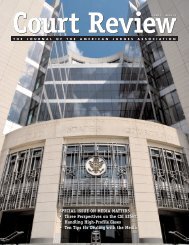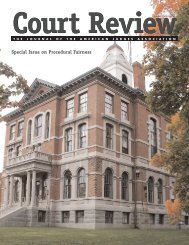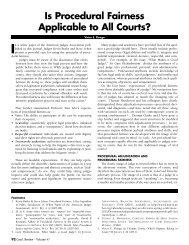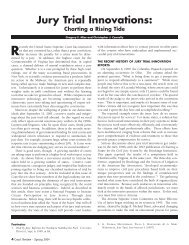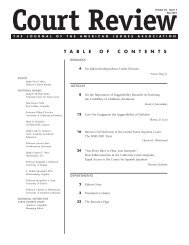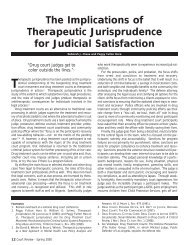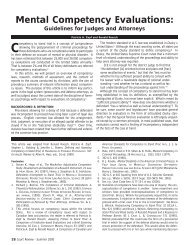Two Letters to Judge Eaton
Two Letters to Judge Eaton
Two Letters to Judge Eaton
Create successful ePaper yourself
Turn your PDF publications into a flip-book with our unique Google optimized e-Paper software.
C ESSAY<br />
<strong>Two</strong> <strong>Letters</strong> <strong>to</strong> <strong>Judge</strong> Ea<strong>to</strong>n<br />
Paul D. Carring<strong>to</strong>n<br />
The two letters set forth below are quite factual; they were sent and received very much as they appear here. I have modified<br />
them only insofar as necessary <strong>to</strong> conceal the identity of the protagonist, who is entitled <strong>to</strong> have the events described remain<br />
a private matter. I publish them as a comment on current federal law limiting the discretion of judges in imposing sentences<br />
on offenders. With many others, I favored sentencing guidelines and was among the first <strong>to</strong> advocate them in 1965. Reflecting<br />
on decades of experience with them, I recant. The old system of absolute discretion in sentencing by the trial judge is better than<br />
what we have. What follows is a piece of evidence supporting that view.<br />
A gracious response <strong>to</strong> the second letter was received from the elderly <strong>Judge</strong> Ea<strong>to</strong>n, who expressed the hope that his descendants<br />
might ever read about his decision in Ike’s case. I share his hope.<br />
Paul D. Carring<strong>to</strong>n<br />
University of Michigan Law School<br />
Ann Arbor, Michigan 48104<br />
September 16, 1971<br />
Hon. Joseph Ea<strong>to</strong>n<br />
United States District Court<br />
Southern District of Florida<br />
Miami FL<br />
Dear <strong>Judge</strong> Ea<strong>to</strong>n:<br />
I write in regard <strong>to</strong> Isaac Rosen who will come before you for sentencing next week.<br />
I have known Isaac since 1956. At that time, his father Myron (Mike) was in the Army, as was I. We<br />
were both stationed at the Aberdeen Proving Ground. We both lived with our families in a building<br />
erected <strong>to</strong> house married soldiers. “Ike” was four when our second child was born there in 1957. Partly<br />
because his father was a Captain and I was a Private First Class, we were not close at that time.<br />
But when my wife and I moved <strong>to</strong> Ann Arbor in 1965, we were pleased <strong>to</strong> discover the Rosens as<br />
neighbors. Ike sometimes played wiffle ball or <strong>to</strong>uch football with our children.<br />
In 1967, Ike was expelled from Ann Arbor Pioneer High School because he wore his hair in violation<br />
of the school’s grooming rules. As a friend, I appeared before the Ann Arbor School Board <strong>to</strong> argue that<br />
the grooming rules were <strong>to</strong>o severe. It happened that on the day of the school board meeting, a colleague<br />
<strong>to</strong>ok me in<strong>to</strong> his bank while he cashed a check. The Presidents of the United States were pictured on the<br />
wall. I observed that only four of them would be permitted <strong>to</strong> attend Pioneer High School. I called that<br />
situation <strong>to</strong> the attention of the school board, and they rescinded the grooming rules.<br />
14 Court Review - Summer 2000
Despite my success as his lawyer, Ike refused <strong>to</strong> return <strong>to</strong> school. He was an irrationally angry young<br />
man. Ann Arbor is the sort of <strong>to</strong>wn in which very smart children sometimes grow up <strong>to</strong>o fast. Ike at<br />
fourteen was a strenuous anti-war activist and deeply embittered by what he perceived <strong>to</strong> be the bovine<br />
indifference of the community <strong>to</strong> the brutalities occurring in Vietnam. He could not stand it that his parents<br />
continued <strong>to</strong> go <strong>to</strong> work, keep house, visit with friends, and indeed go on living while there was<br />
Vietnam on the tube every night.<br />
Not long after the school board rescinded the grooming rules, Ike moved out of his parents’ house. I<br />
encountered him on the street a little later and saluted him; he gave me a hostile glare but did not otherwise<br />
acknowledge me. We then heard that he was living in a garret or a garage somewhere around <strong>to</strong>wn.<br />
Time passed, and his parents received word that he had moved <strong>to</strong> upper Michigan. A year passed.<br />
Somehow, he sent word <strong>to</strong> his father, Mike, that he was living in Amsterdam. Another year passed. It<br />
was rumored that he was now in Morocco. His grandmother went <strong>to</strong> Morocco <strong>to</strong> look for him in the<br />
dens and brothels of Marrakech, but she did not find him.<br />
Then last spring, Mike called me <strong>to</strong> say that he had heard from Ike. “Great,” I said. “But,” he said,<br />
“he is in the cus<strong>to</strong>dy of the United States Marshal. He has been busted for smuggling. He wants me <strong>to</strong><br />
send him a lot of money so he can try <strong>to</strong> bribe a federal officer or judge <strong>to</strong> let him out. Should I do<br />
that” Of course I derailed the absurd guardhouse idiocy, and found him a lawyer, an alumnus of this<br />
law school, and on his advice, Ike has pleaded guilty.<br />
Meanwhile, however, he was allowed <strong>to</strong> return <strong>to</strong> Ann Arbor. Mike made him come see me. He was<br />
still as hostile as he had been that day on the street, but was at least submissive enough <strong>to</strong> ask my advice.<br />
I <strong>to</strong>ld him I had none, really, but that I did know an old judge Lincoln in state court in Wayne County<br />
who had <strong>to</strong>ld me that he had sentenced 25,000 children in his years on the bench, and that his iron rule<br />
was never <strong>to</strong> send one <strong>to</strong> training school if he had a job or if he was making progress in school. “Maybe,<br />
Ike,” I said, “you might get a lighter sentence if you found work.”<br />
I do not know that my words made an impression, but he did find a job supervising newsboys for the<br />
Ann Arbor News. This was only part-time work, so he enrolled in the high school completion program<br />
at Washtenaw Community College. That did not fill his time, so he <strong>to</strong>ok a night shift job working in a<br />
<strong>to</strong>ol and die shop. The daughter of the owner of the shop <strong>to</strong>ok a shine <strong>to</strong> him, and she is now his steady<br />
company when he is not working or studying. He now smiles. He smiles a lot.<br />
It seems <strong>to</strong> me there is a good chance that Ike is now able <strong>to</strong> take care of himself and will do so. I<br />
don’t know if you subscribe <strong>to</strong> <strong>Judge</strong> Lincoln’s iron rule, but this might be a very good time <strong>to</strong> apply it.<br />
I hope these thoughts are useful. Best wishes.<br />
Sincerely yours,<br />
/s/ Paul D. Carring<strong>to</strong>n<br />
Summer 2000 - Court Review 15
Paul D. Carring<strong>to</strong>n<br />
Duke University School of Law<br />
Durham, North Carolina 27708-0362<br />
September 16, 1999<br />
Hon. Joseph Ea<strong>to</strong>n<br />
United States District Court<br />
Southern District of Florida<br />
Miami FL<br />
Dear <strong>Judge</strong> Ea<strong>to</strong>n:<br />
This is my second letter <strong>to</strong> you. The first was written twenty-eight years ago <strong>to</strong>day.<br />
Perhaps you recall my first letter. I enclose a copy <strong>to</strong> refresh your recollection. You of course did not<br />
answer it. But, as his father reported the sentencing hearing <strong>to</strong> me, you asked Ike if it was true that he<br />
had trouble with authority. He grunted an affirmative answer. You acknowledged that you, <strong>to</strong>o, sometimes<br />
had trouble with authority. You then stated that the pre-sentencing report <strong>to</strong>ld you that you ought<br />
give him at least five years of hard time. You then stated that his sentence was indeed five years.<br />
However, you said, “Just <strong>to</strong> show that I <strong>to</strong>o can defy authority, I hereby suspend the whole sentence. If<br />
you get caught speeding in the next five years, you will begin with five years in the federal penitentiary<br />
and then they can worry about the speeding ticket on <strong>to</strong>p of that. Go make a life for yourself, Mr. Rosen,<br />
and then you can forget the last four years.”<br />
You may not know that Ike a few weeks later married the girl friend mentioned in my previous letter.<br />
She was an undergraduate at Michigan. Ike finished his high school course, and enrolled at Eastern<br />
Michigan University in nearby Ypsilanti. After a year of all A’s, he transferred <strong>to</strong> the University of<br />
Michigan where he compiled a spectacular undergraduate record. He went on <strong>to</strong> do graduate work at the<br />
University of Chicago. His record there earned him a faculty appointment at Berkeley. He is now a professor<br />
of cell biology at that distinguished university. He and his wife have two children who prosper in<br />
school.<br />
I salute your wisdom. I am informed that if Ike had come up for sentencing in 1999 that the judge<br />
would have had no authority <strong>to</strong> suspend the sentence, and that he would have spent as much as twenty<br />
years in the federal penitentiary. What a tragic waste!<br />
Best wishes.<br />
Sincerely yours,<br />
/s/ Paul D. Carring<strong>to</strong>n<br />
Paul D. Carring<strong>to</strong>n is a law professor<br />
and former dean at the<br />
Duke University School of Law.<br />
16 Court Review - Summer 2000



